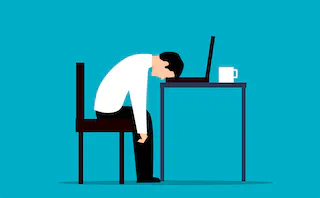
Dealing with depression & a primer on emotional management
- Matthieu P.J.
- Wellbeing
- January 30, 2022
I’ve suffered from depression for years. It’s not an easy topic to throw into social conversations, but I’ve become more comfortable talking about it over time. I believed it was natural to feel very low at regular intervals, until I realised it probably wasn’t… I had normalised the fact that, during several days or even weeks, I would have an extremely low mood and low levels of energy. Nothing seemed to matter anymore and I was retreating inwards, often shutting down communications with just about everyone. I was just feeling horrible inside; I didn’t feel like doing anything. It was a state of stagnation.
Depression is just a label, behind that word lies a certain experience and personal reality that is worth examining. Just because we coined a word for that does not give us any power over it, it’s just reassurance for the rational mind that we’ve catalogued the condition. Today, there are medications and treatments for depression, but somehow a part of me knew that the solution wasn’t there. I am very independent and the idea that I should rely on a substance to lift my mood up (especially considering some are extremely addictive) was not the answer I was looking for. Plus, these periods of depression were only temporary. I would feel the end of the ride coming and my mood getting progressively better. I would then have rare moments of clarity about many things going on in my life—one of the gifts of depression—and would close this bad chapter. I felt I had ‘got it’: the message behind it, the insights, the changes of direction to take in my life. A few weeks later, I would have moved on to the point that I’d be totally oblivious that I had been down the abyss. Well, until the next fall…
In my case, the fact that an episode of depression would only last for so long and then I’d recover by myself made it easy to dismiss the nature of what was going on. I knew something was off, yes, but I wasn’t sure what I could possibly do. After all, it was going to pass by itself sooner or later and I’ll just have to brace myself for a little while. It was like a contraction phase in my life: I’ll put things on hold, I’ll slow down, I’ll recentre on the bare necessities. And it was so irrational—because emotions escape reason—that I could have felt so bad whereas a few days later I would feel merry and ‘back on track’. I would think I know what to tell myself to cheer me up the next time, except that it didn’t work. The next time, I would again get paralysed for a few days despite my best efforts. It’s like I was riding a horse but then I fell from time to time.
There are also elements of shame and guilt associated with depression. There’s the widespread false belief that we should be happy, that being sad or depressed makes us dysfunctional and undesirable elements of society, people better being avoided etc. That perceived stigma means some of us may choose to keep it to ourselves. So I’ll typically cope the best I could for days, keeping an appearance of normality; but inside, I was crumbling… Not sharing that with anyone meant I could hardly admit to myself that there was a problem; it actually didn’t help.
All of that was before I started to own my emotional health and do some work on myself. Depression eluded me because I simply didn’t get what emotions really are. I am not a doctor or a health professional, so what I share is based on my own experience and interpretation of states of depression. But chances are it could help you.
Table of Contents
Emotional management is the key to the exit door from depression
Understanding emotions
We are not only supposed to be happy. That’s a myth, reinforced by media culture and movies where it seems that the baseline for people is happiness and fun. That die-hard myth means—if we believe it—that we’ll experience cognitive dissonance when we feel low mood levels. We want to be part of the happy majority so we’ll think that something’s wrong with us! That fundamental misunderstanding of human emotions is an obstacle on the way to personal growth.
A necessary skill to acquire to live a balanced life is emotional intelligence. That means understanding and managing our emotions—and that of others. It’s not something I’ve learned at school because we put the emphasis on the intellectual intelligence in western societies. This leaves a big vacuum to understand a fundamental part of our being.
We are a complex being experiencing a physical reality. Just like there are four elements in nature, we have four aspects in our being:
- the body (Earth)
- the mind (Air)
- the emotions (Water)
- the spirit (Fire)
The watery nature of emotions is obvious: emotions can take us to deep and dark places, they are fluid in nature because they change and one bring the other without clear separation, they can take many different shapes and have a mysterious nature, and our tears are expressions of emotions. It’s also worth noting that emotions are ruled by the sacral chakra which is the water centre. Considering our bodies are constituted of a majority of water, we could say that emotions permeate us: we are emotional beings.
Emotions are messengers of the soul. They guide us in life. They bypass the thoughts and offer a unique perspective and insight onto the experiences we are having. However, the dysfunctional attitude of our societies towards emotions means that we come unequipped with tools to navigate our own emotions as we grow up. That is a skill we have to pick up ourselves—and some never will.
Emotions inform us about so many things: things to say, actions to take, choices to make, if we can trust people or situations, if we are on the right track in life . But the messages delivered are not always pleasant to hear and our ego may not like to recognise there is a problem to address. In fact it may absolutely hate it because it feels threatened. Therefore, it’s tempting to kill the messenger rather than facing what it has to tell us.
Connecting with your emotions
It’s certainly more pleasant to feel positive emotions such as: happiness, contentment, joy ; rather than facing: anger, apathy, shame, fear, jealousy, terror, sadness or depression. But we cannot operate all the time in joy, because life is dynamic and things can throw us off-balance at any moment. We need to deal with situations and people and that creates ripple at the surface of our ’emotional lake’. We’d like to keep that lake smooth and peaceful, but sometimes there are big waves coming in.
Avoidance and resistance create pain in life. That is true of many things and particularly of emotions. Once we understand that we can work with our emotions rather than feeling incapacitated by them—and feeling we’re not normal because everybody seems happy around us—we have reached a significant milestone. Embracing our emotions is the answer. Because if we resist them, we are burying them even deeper in ourselves and that is a recipe for disaster. Disowning our emotions—and what they’re trying to tell us—paves the way towards suffering. If that pattern occurs repeatedly, depression may just be around the corner…
Emotions have different levels of vibration associated to them; unfortunately, apathy and depression are at the very low end of the spectrum. It means there’s a lot of work to do to extract ourselves from these emotional states. In depression there’s no energy left to engage in activities: it’s a state of stagnation. Which means we can drown if we stay there for too long. Other emotions, while still low vibrations, are preferable to depression. That is the case of anger because in anger there’s at least energy to take actions.
Realising that emotions have a different level of vibration (or energy) does not mean some are bad and others are good. That dualistic view impedes our development so much. We can simply observe that there’s more energy in anger than depression. Just like there’s more energy in love than anger.
All emotions are necessary. We have somehow evolved to have these indicators and we merely need to learn their language to function in harmony with life. Emotions do not lie—unlike the ego mind. They are messengers from above and in that they are precious. Emotions can be channelled. Let’s look at anger again. Anger unlocks a lot of energy. So, when anger arises, we can use its energy in a destructive way: using the word to hurt, or even physically hurting; or we can take positive actions to address the perceived problem and improve our life in a conscious way. We can pour the energy of anger into something meaningful instead of just venting it.
Facing depression
Depression removes your energy to force you to stop and look at your life, because things have not been going on well for a while. The build up of energies and emotions in the weeks and months preceding the depression is what you need to look at. It’s an invitation for introspection and reflecting on the emotions that have not been addressed properly, and being truthful to ourselves about what has hurt us.
Honouring the emotion of depression is required to move out of depression. One motto that prevails in emotional management is: “the only way out is through”. No matter how hard we try, we know deep inside us—with sufficient honesty—that we will have to confront our emotions and deal with them face-to-face, and that we cannot run away from them. They are part of us and no matter where we go or whatever distractions we invent to busy ourselves, they will stay with us. In fact, long repressed emotions combine and merge to create an inner agony that sucks energy out of our life. It is our poor emotional management that can manifest a personal hell on earth, not any other mystical force.
Depression is a state where our energy has abandoned us because certain things require our attention. There’s been an accumulation of negative emotions before the onset of depression and we’ve been unwilling to address it. Now is the time when the emotions ring the alarm and ground us to do our homework: facing what is going on in our lives.
The path out of depression requires to reach other stages, like stepping stones. First we must look inwards to understand what has been going on over the last weeks months or even years. We must understand the message: some things have gone wrong and it’s time we are honest with ourselves about it!
Then we must work with our disenchantment: feel those emotions fully in our soul, detach from them and let them go. There are many things that we may need to let go of: lost dreams, unhealthy attachments to people or situations, dead-ends we’ve reached a while ago but we’ve stubbornly kept trying, and other emotions themselves. Because emotions are like Russian dolls: one hides the next. They are nested inside each other. Depression could have arisen because of fear, sadness, anger or a combination of all.
Sadness is the gateway to letting go. Connecting with our inner sadness and biding farewell to our disenchantment brings a huge relief and unties some stuck energy. Then we can progressively move towards the next phases. Courage, where we take ownership of the problems we’ve faced, step out of the victim mentality, refuse to blame others or ourselves for our fall and work onto a plan to make changes in our life. Acceptance, where we come to realise that our fall was meant to happen given our past trajectory and that it’s all right, we can accept that things have happened just the way they have happened even if it was a tough ride. And finally peace, where we can see the blessing in disguise: we’ve been forced to deal with our problems, we’ve grown and we’ve decided to amend our life in a number of ways that will bolster our evolution for the coming months or years; finally, we have a plan for the next phase of our life. Living as a human being is difficult, but we’ve made it through this tough time and we can now feel at peace with ourselves.
The rise out of depression is one of those inner journeys that brings a profound satisfaction. Sure, we’ve fallen. But we’ve also decided to pick ourselves up and rise again. That is an ascending movement that brings enlightenment to the soul.
The power of the mind
While dealing with emotions is the driver out of depression, the thoughts we experience are an element that cannot be overlooked.
There are moments of deep realisation that are hard to put into words. A profound contemplation of the nature of mind would lead me to very same conclusion time and time again during an episode of depression. Its conclusion is very simple but grasping it is not easy—even less implementing that in your life.
So what is that conclusion? It is that, at the root of existence, there is only mind. And mind controls everything in our experience, whether we are aware of it or not. The thoughts appearing on the screen of our mind are what control our entire life experience, with an undeniable impact on our mood. Isn’t that obvious that the constant and insidious rumination of negative thoughts can lead to a miserable existence? Oh YES!
Until you truly realise the influence of your thoughts on your life, you are blind to a fundamental truth of existence. The thoughts that we allow ourselves to hold in our consciousness are driving so much in our lives. In fact, it is our patterns of thinking that can create a fertile ground for depression . Or equally, healthy patterns can keep us in high vibrations and make our life effortless and peaceful.
Thinking over and over again about past hurts is a major blocker on our path to inner peace. If not addressed, it will escalate until for example it becomes a habit first thing in the morning to think about such and such person or situation that did not go our way. Why not think about our last holidays, the last moment of joy we felt or a precious shared memory with a loved one? Well, part of the answer is because negative thinking is addictive and self-reinforcing. It takes a considerable amount of willpower to overcome it, but that must be done to rewire our brains and find balance.
In intellectualised societies like ours, we’re over-relying on our mind to live our life—the air, only one of the four elements. That can only create imbalance. We do not need to use our mind that much, but we’ve not been taught that. Instead, compulsive thinking is the norm.
“It is no measure of health to be well adjusted to a profoundly sick society.”
—Jiddu Krishnamurti
It is the realisation that we have the choice, that we can guide our thoughts towards positivity and happiness rather than negativity and self-degradation that is liberating. That is the mighty power of choice. The choice we always have—but may not realise—is to allow whatever thought that arises in our consciousness to stay with us, or to let it go entirely.
Conclusion
The cycling of happy moments—or at least undisturbed by depression—and depression itself has been my experience for decades. I don’t think it’s the only way to live, I don’t think you have to fall into an abyss to find yourself climbing to the other side. But I know it happens for a reason. And until it needs to happen, it will keep happening. Our thoughts and emotions have an intelligence of their own that we can tap into . A healthy management of emotion coupled with conscious thinking is my remedy.
It’s not easy to work with emotions, especially if you’ve grown up surrounded by people emotionally shut-down. There is a long path to walk, but it has to be done to evolve. Learning to properly deal with my emotions has changed my life. But for an intellectual type like me, I think it’s the journey of a lifetime. These messengers of the soul are there to guide us and if we don’t listen to them—or try to silence them—it’s only going to backfire. The healthy habit is not to leave any unaddressed emotion to fester but to bring them under the spotlight. And let go of what needs to be surrendered as you go along rather than waiting for an emergency stop—a.k.a depression.
Depression carries stigma in our societies. We are unwilling to look at the negative emotions in our life (sadness is another one) and are programmed with the false belief that life is about being happy all the time and that if we can’t achieve this, then we have failed. Teaching emotional intelligence has a long way to go… And recognising that each emotions has got something of value to tell us.
Once we have overcome depression, we will naturally correct our life trajectory because we’ve understood certain things about our life. When energy levels start rising again, that is a beautiful time: the time for action. All the things that were going wrong in life, highlighted by the depression episode, are re-examined from a different angle, with a will to change some—if not all—of them. That can lead to re-organising one’s life to a large degree. And we find ourselves in a state of expansion.
So that’s the real gift of depression. The emergence out of doubt, gloominess and paralysis. Standing up after having fallen and stayed on the ground agonising for what seemed to be eternity. The rebirth into the world and the urge to take charge and change things—at last!


